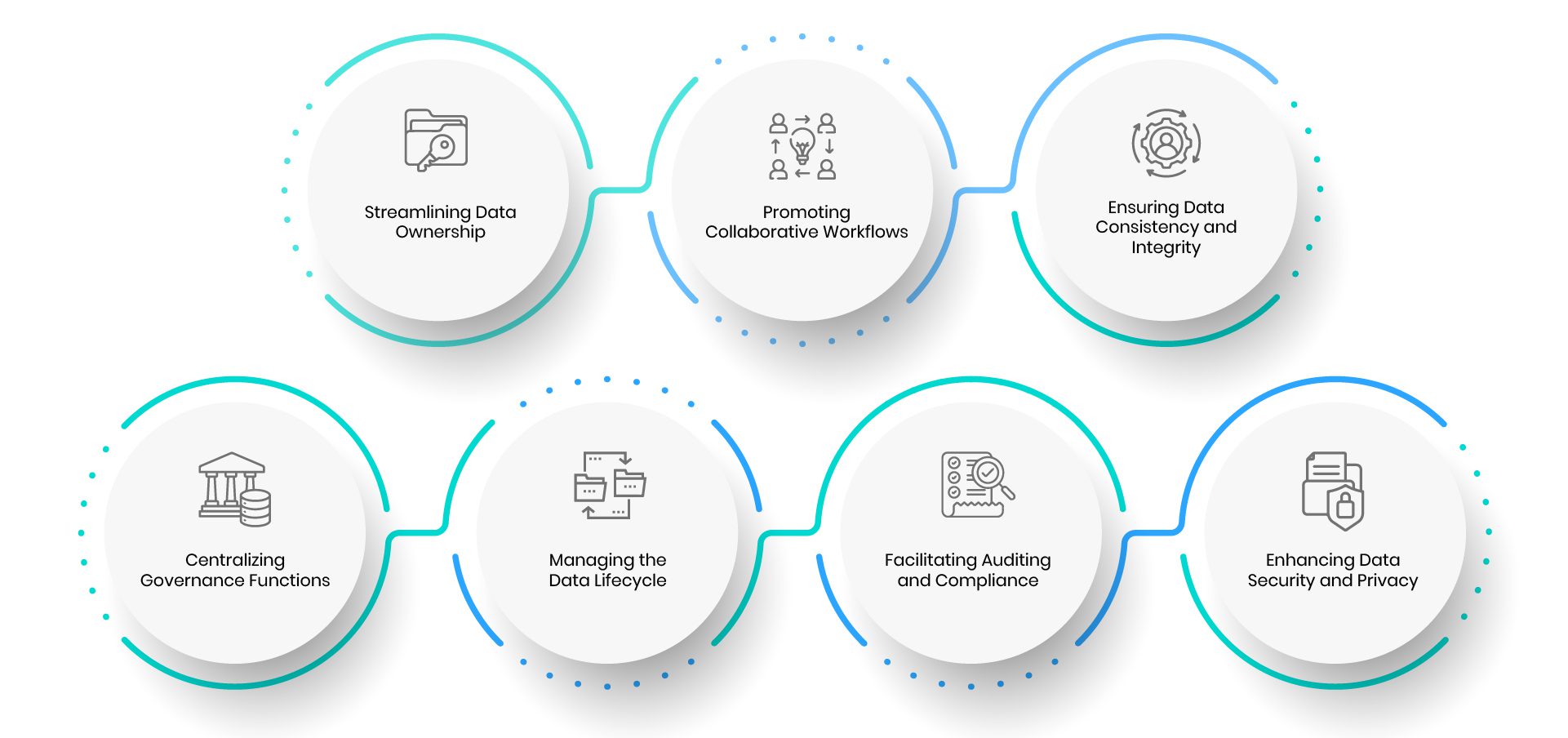- Digital transformation has led to an explosion in data volumes, with an expected 180 zettabytes of data by 2025, prompting a shift away from traditional centralized data control.
- IT departments typically control data infrastructure, but decentralization, where data owners are empowered within established guidelines, is gaining traction for enhanced data management.
- Centralized data management offers standardized security and compliance but may lead to data sprawl and a loss of granular control over time.
- Decentralization distributes data ownership and control, with IT departments setting overarching guidelines while individual data owners manage their data autonomously within the framework.
- Unified Data Management (UDM) software has emerged as a linchpin in this transformation, enabling data owners of all technical backgrounds to seamlessly access, comprehend, and act upon data, thereby steering the course for enterprise data management.
Amidst the digital transformation journey, enterprises have unlocked a potent asset: data. Yet, harnessing its power while navigating its complexities poses a critical challenge. The proliferation of data volumes, driven by cloud adoption, mobile devices, and the Internet of Things (IoT), has led to an exponential growth trajectory. According to IDC, by 2025, an astonishing 180 zettabytes of data are expected to exist. While the promise of valuable insights is undeniable, effectively managing this “data deluge” necessitates a departure from traditional, centralized controls of data.
Traditionally, IT departments have held the reins of enterprise data, overseeing data infrastructure, storage, and risk management. This centralized approach offers a standardized security and compliance framework. However, there’s ample opportunity for enhancement. By decentralizing the actionability of data within the guardrails set by IT, we can optimize the effectiveness of our data management strategies. This approach involves empowering data owners with the authority and responsibility to act within established policies while adhering to guidelines set by IT and security departments. In essence, accountability shifts to the data owners, fostering a more dynamic and responsive data governance environment.
This paradigm shift represents an exciting opportunity to revolutionize data management practices. By decentralizing data ownership and accountability, organizations can unlock agility, innovation, and efficiency while maintaining stringent security and compliance standards. Let’s explore how this transformative approach can drive organizational success in the era of data abundance.
Centralization vs. Decentralization
Most enterprises follow a centralized approach, where control over IT infrastructure and data management is consolidated within the IT department. This model offers some notable benefits, including streamlined oversight and efficient resource allocation. With control concentrated within the IT department, there’s a greater ability to enforce standardized procedures, ensuring consistency and compliance with organizational policies and standards. This centralized approach can also lead to cost efficiencies, as resources and expertise are pooled, reducing redundancy and optimizing infrastructure utilization.
However, alongside these advantages come certain drawbacks. One significant concern is the risk of data sprawl – files scattered across servers, cloud platforms, and individual devices, making it difficult to track, manage, and secure. It’s a nightmare scenario for IT departments tasked with maintaining data integrity and compliance. In centralized data management systems, data can become dispersed across various systems and applications within the infrastructure, making it challenging to track and manage effectively. Additionally, there’s a potential loss of granular control over data access and management, particularly as organizations grow larger and more complex. This centralized structure can also create a single point of failure, leaving the organization vulnerable to disruptions or cyberattacks.
However, decentralization within the guardrails of IT offers a promising solution to this pervasive problem. By distributing data ownership and control across departments and teams, organizations can effectively nip data sprawl in the bud. In a decentralized approach, the IT department continues to play a crucial role in setting guidelines and policies that govern how data is managed and protected within the organization. These guidelines encompass various aspects, including data access controls, encryption standards, data retention policies, and procedures for data backup and recovery. The IT department, often working in conjunction with the security team, establishes these protocols to ensure compliance with regulatory requirements, mitigate security risks, and maintain the integrity and confidentiality of the organization’s data. Individual data owners, while being in charge of their own data, are expected to adhere to these established guidelines and policies set by the IT department. However, within a decentralized framework, data owners retain a significant degree of autonomy and control over their data. They have the flexibility to take action based on the guidelines set by the IT and security teams about how their data is accessed, shared, and utilized. This means that they must implement appropriate security measures, follow prescribed procedures for data handling and storage, and ensure compliance with relevant regulations and internal policies for every file they create. Data owners thus become accountable for deciding the journey of the data they create, making sure its secure, optimized and governed while still aligning with organizational standards and compliance requirements.
Moreover, the IT department provides support and resources to assist data owners in fulfilling their responsibilities effectively. This may include offering training programs on data security best practices, providing access to tools and technologies for secure data management, and offering guidance on regulatory compliance requirements.
This is where the concept of data sovereignty comes in. Data sovereignty emphasizes the rights of individuals or entities to maintain ownership and control over their data, regardless of where it resides or how it is processed. It encompasses a range of principles, including the right to determine how data is accessed, used, and shared, as well as the ability to revoke consent for its processing.
By recognizing data sovereignty, organizations affirm the autonomy and agency of data owners in managing their data assets. This not only enhances trust and transparency but also strengthens compliance with data protection regulations such as the GDPR (General Data Protection Regulation) and CCPA (California Consumer Privacy Act). Data sovereignty serves as a cornerstone of privacy and data protection frameworks, ensuring that individuals retain control over their personal information and empowering them to assert their rights in an increasingly data-driven world.
Overall, decentralization ensures a balance between centralized oversight and individual accountability. While the IT department sets the overarching guidelines and standards for data management and security, individual data owners are empowered to exercise control over their data within the established framework, fostering a culture of responsibility, collaboration, and trust within the organization.
In this transformative approach to data management, Unified Data Management (UDM) serves as a linchpin, offering a comprehensive solution to the challenges of data ownership and control. By providing a unified software for data integration, quality management, governance, master data management, and security, UDM empowers organizations to decentralize data management while maintaining centralized oversight and control.
Decentralization in Enterprises: 7 Ways How Unified Data Management Paves the Way

- Streamlining Data Ownership: UDM software empowers data owners by offering a suite of intuitive tools for self-service data management. From seamless data provisioning to comprehensive cataloging and fine-grained access controls, data owners gain autonomy over their data assets while adhering to organizational policies and standards. This not only fosters a culture of data ownership but also enables individuals to extract maximum insights and value from their data, driving innovation and informed decision-making across the organization.
- Promoting Collaborative Workflows: UDM serves as a nexus for collaboration among dispersed teams, providing a centralized software for sharing, accessing, and collaborating on data assets. Regardless of geographical location, departmental silos, or technical proficiency, data owners can effortlessly collaborate with stakeholders to share insights, resolve discrepancies, and establish common data definitions and standards. By fostering seamless collaboration, UDM cultivates a culture of transparency, efficiency, and synergy, unlocking the collective intelligence of the organization.
- Ensuring Data Consistency and Integrity: UDM software plays a pivotal role in safeguarding data consistency and integrity through robust data quality management capabilities. Leveraging sophisticated tools for data profiling, cleansing, and validation, data owners uphold the quality of data assets, mitigating risks associated with inaccuracies, errors, and redundancies. By enforcing uniform data quality standards across decentralized teams, UDM instills trust and confidence in the accuracy and reliability of data, laying the foundation for data-driven decision-making and strategic initiatives.
- Centralizing Governance Functions: Despite the distributed nature of data ownership, UDM centralizes governance functions, enabling organizations to establish and enforce data governance policies, standards, and procedures with ease. Within the UDM softwares, data owners can effectively manage governance rules, access controls, and compliance requirements, ensuring alignment with organizational objectives and regulatory mandates. This centralized governance framework promotes accountability, transparency, and compliance, mitigating risks and enhancing organizational resilience in an increasingly complex regulatory landscape.
- Managing the Data Lifecycle: UDM streamlines the management of the data lifecycle, providing data owners with the tools and workflows necessary to govern data from inception to disposal. By implementing lifecycle policies within the UDM software, organizations can effectively manage data retention, archiving, and disposal processes, optimizing storage resources and mitigating risks associated with obsolete or redundant data. This proactive approach to data lifecycle management ensures data relevance, integrity, and accessibility, driving operational efficiency and mitigating compliance risks across the organization.
- Facilitating Auditing and Compliance: UDM software offers robust auditing and compliance capabilities, empowering organizations to monitor data access, usage, and changes across decentralized teams. Through comprehensive audit trails, real-time monitoring, and customizable reporting features, data administrators can ensure compliance with regulatory requirements, industry standards, and internal policies. By providing visibility into data activities and enforcing adherence to compliance mandates, UDM enables organizations to effectively mitigate risks, address audit inquiries, and uphold the trust and integrity of their data assets.
- Enhancing Data Security and Privacy: UDM software prioritizes data security and privacy, incorporating advanced features to protect sensitive data assets against unauthorized access, breaches, and compliance violations. From encryption and access controls to data masking and anonymization, UDM empowers data owners to implement robust security measures tailored to their specific needs. By enforcing security policies and privacy controls centrally, UDM helps organizations maintain confidentiality, integrity, and privacy of data, ensuring compliance with evolving regulatory requirements and safeguarding against emerging threats in an ever-changing threat landscape.
The Data Dynamics Advantage
Amidst the evolving digital landscape, the surge in individual data ownership and control signifies a monumental shift, presenting organizations with unprecedented opportunities for data-driven insights and transformative achievements. However, grappling with the relentless deluge of data generated every second can render concepts like control, consent, and transparency daunting for many.
In response to this formidable challenge, Data Dynamics presents its Unified Data Management Software—a beacon of simplicity amidst complexity, empowering enterprises to navigate the intricate terrain of data sovereignty and democratization. Trusted by over 28 Fortune 100 organizations, this comprehensive solution comprises four essential modules: Data Analytics, Mobility, Security, and Compliance, seamlessly integrated into a single software architecture.
By decentralizing data ownership and control within the guardrails of IT, Data Dynamics simplifies the processes of data security, compliance and intelligence through a unified interface. This consolidation enables organizations to consistently and precisely comply with evolving data privacy regulations, regardless of the multitude of data collection channels employed.
With the Unified Data Management Software, companies can effortlessly monitor and audit data usage and ownership across their operations, mitigating the risk of non-compliance and associated legal consequences. Moreover, its advanced analytical capabilities provide valuable insights into enterprise-sensitive data, trends, and behaviors, empowering companies to fortify their data security measures while refining practices to better align with customer preferences and regulatory mandates.
In summary, Data Dynamics’ Unified Data Management Software emerges as a powerful ally for businesses navigating the complex landscape of data rights, concurrently delivering exceptional and privacy-conscious experiences to their clientele. To embark on a journey of streamlined data management and compliance, learn more about Data Dynamics by visiting www.datadynamicsinc.com or reaching out to us at solutions@datdyn.com or (713)-491-4298.






